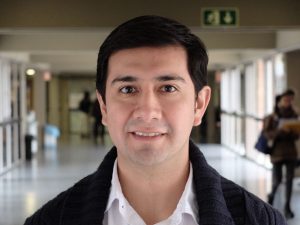 Alfonso Antonio Hernández Vivanco, PhD graduate in Business at the UB Business School, has been awarded the extraordinary doctoral prize for the academic year 2018-2019. The decision was taken by the Governing Council of the Universitat de Barcelona past October 7th, 2020.
Alfonso Antonio Hernández Vivanco, PhD graduate in Business at the UB Business School, has been awarded the extraordinary doctoral prize for the academic year 2018-2019. The decision was taken by the Governing Council of the Universitat de Barcelona past October 7th, 2020.
Dr Hernández Vivanco defended his PhD thesis titled “Understanding Innovation within the context of the Integration of Management Systems” on July 16th, 2018. The research, directed by the UB Business School researchers Dr Mercè Bernardo and Dr Claudio Cruz Cázares, aims to understand how organizations manage to innovate in a way that they meet with the requirements of several stakeholders effectively in order to be sustainable. He published some of the papers that constitutes the thesis with other co-authors like “Do multiple certifications leverage firm performance? A dynamic approach” at International Journal of Production Economics, 218:386-399, 2019.
We have recently interviewed him in order to deepen on her feelings, his research and his experience at the University of Barcelona.
How do you feel about receiving this prize?
I feel really excited about it! I honestly did not expect it, but I am glad to know that my research has been considered valuable to the judges of this prize, so I hope it also benefits other researchers and practitioners in the field.
Why did you decide to undertake your research on the topic of your thesis?
The main reason why I chose it was because the topic really excited me. It all began with the final project of my Master’s degree. There I had the chance to look at two major topics that had always intrigued me: quality and innovation. Because of my previous experience in industry, it was clear to me that both concepts were closely related and sometimes even overlapped so I was not sure that a true PhD could be born from this idea.
However, when I began to investigate, nothing was really clear anymore. Other concepts began to interact with innovation and quality: environment, labour health & safety, sustainability, collaboration networks, open innovation, and so on. This is how quality became to me just a small piece in the puzzle of management systems, and also innovation became a vast and challenging concept that was worth investigating. Therefore, being able to contribute to such a great and beautiful field was something I had to take advantage of.
What was your first conclusion when you finished the research?
I think that this research is not completely finished so my first conclusion was “there is still much work to be done”. As I kept investigating in this field, plenty of questions emerged to me and most of them are still being discussed both in academia and industry. However, I could experience from this thought that the work that is still to be done is actually innovation that is to come, and that every day millions of people are trying new (managerial) practices that make them innovate in better ways and with better results.
The truth is that all of them are doing it in order to chase their own growth and sustainability. This is how my first conclusion was that innovation and management systems seem to work together within companies so they can keep asking themselves what else is there to be done in order to achieve their present and future success.
How was your experience as a student at the University of Barcelona?
The experience was very gratifying. Starting from my directors, Mercè and Claudio, I had the chance to collaborate with great people and leading researchers in my field who enriched my knowledge and guided me through this journey. Thanks to the University of Barcelona, I had access to very valuable sources of information such as datasets, scientific papers, top congresses, courses, etc.
Also, something I really appreciated as a student is the access to grants and travel opportunities to further develop my work. The University of Barcelona gave me this chance so I was able to assist several congresses in Europe and also to develop part of my PhD abroad, at the University of Minho (Portugal) in collaboration with recognized researchers. In the day to day as a student I also felt really comfortable with the environment there was with other students, mostly international, and the good friendship we created with many of them.
Are you currently involved in a research or professional project?
Right now I am mostly involved in a professional project closely related to my PhD, not only because of the topic, but also because of the methods I learned related to data science with an orientation towards innovation and best practices. This project is within a family business started about 35 years ago by my parents, so I am very excited that I can contribute with it. Although at this moment I have less time for academic research, I do expect to get back to it in a near future.